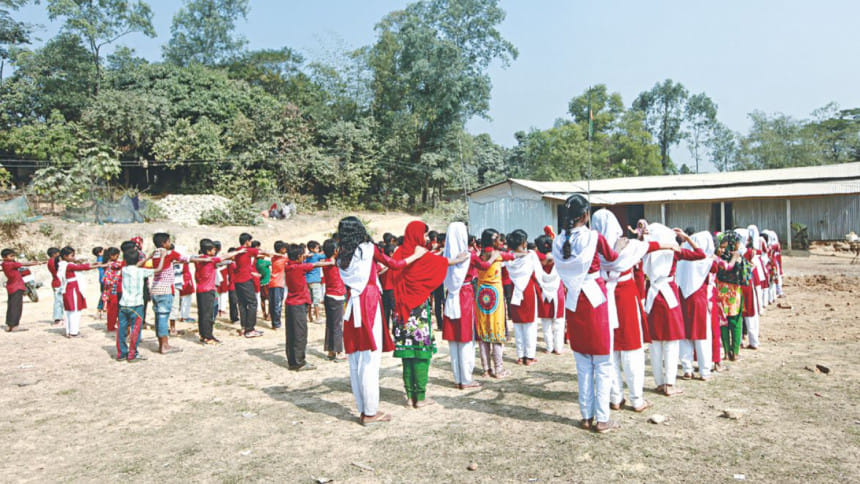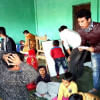As govt fails, locals come forward

The government's long-running 'Guchchhogram' public housing scheme is intended to give landless families a new footing from which they can create prosperous, self-sufficient lives.
In response to the 1988 floods, one such project to house 41 families was built at Jaflong in Sylhet's Gowainghat upazila. But while each Guchchhogram (cluster village) is supposed to include a government primary school, a mosque and a community centre, no school was ever built.
Rather, in 2015 the local community took matters into their own hands, founding the volunteer-run Guchchhogram Primary School.
“The nearest government primary school is more than three kilometres away,” says Karim Mahmud Limon, president of the school's implementation committee. “It's not easy for children to get there, so a number of local volunteers set up a school here.”
“Most villagers are stone quarry workers. They struggle to meet life's daily necessities and don't always appreciate the importance of education,” Karim continues. “But after four years of academic activities, we have around 250 students.”
“We've managed a cent percent pass rate in the Primary School Certificate exams for three consecutive years,” says a proud Sohel Ahmed, the school's head teacher. “It isn't a bad achievement for a school run by eight volunteer teachers.”
To sustain the school in the longer run, it is hoped it will become a government primary school.
Indeed in 2016 local lawmaker Imran Ahmed wrote a letter to the ministry concerned requesting that a government primary school be constructed in the village as a part of the government's pledge to build 1500 primary schools in 1500 villages. The letter recommended the inclusion of the community school as a part of the project. But there's yet to be a result.
“A government school must have its own land,” explains the upazila nirbahi officer (UNO) in Gowainghat, Bishwajit Kumar Paul. “Guchchhogram Primary School sits on government land that hasn't been sanctioned for that purpose. As such, it isn't straightforward to include it in the 1500-schools initiative. But recently we have decided to formally allocate the land to the school so that it will be possible to make it a government primary school soon.”
“The administration is prioritising the request for a government primary school in Guchchhogram village,” confirms Sylhet's Deputy-Commissioner Numeri Zaman. “All necessary steps are being taken to fulfil that request.”

 For all latest news, follow The Daily Star's Google News channel.
For all latest news, follow The Daily Star's Google News channel. 








Comments